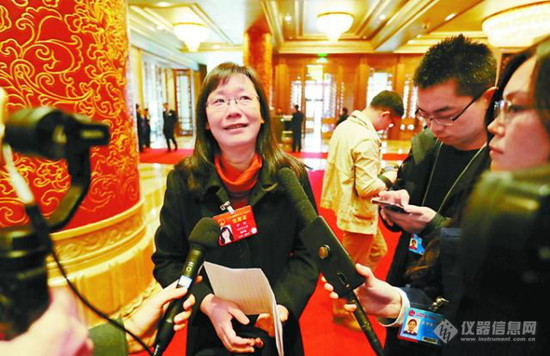[Introduction] Strict reward and punishment clauses should be formulated. For example, if similar instruments are already available in the country and can meet the use requirements, but people still purchase imported instruments at high prices, they will be held accountable and given corresponding punishments once discovered.
Due to various reasons, China's scientific instrument industry has been in a state of lagging behind and catching up. Yi Tong, a member of the National People's Congress and deputy director of the Beijing Center for Science Studies, suggested that the government procurement policy for domestic instruments be further implemented, and that clear and specific implementation rules be formulated for the tax-free policy for imported instruments. At the same time, a tax refund policy should be implemented for instrument companies and the returned funds should be used for technological research and development.

Photo taken by Yi Tong, deputy to the National People's Congress and deputy director of the Beijing Center for Science Studies, Cheng Gong
Yi Tong introduced that the survey results showed that more than 30 kinds of scientific instruments rely on imports for key components, and some instruments rely 100% on imports for key materials. Yi Tong believes that this not only has a huge impact on the domestic instrument industry, but is also not conducive to establishing a new image of Made in China.
Yitong learned that many laboratories of universities, research institutes, national and provincial testing agencies are almost entirely equipped with imported instruments, and more imported instruments are added to the laboratories every year. Many users are unwilling or afraid to use domestic instruments.
Yi Tong believes that domestic scientific instruments are still facing unfair treatment in some areas. She said that the Notice on the Import Tax Policy to Support Scientific and Technological Innovation during the 13th Five-Year Plan Period jointly issued by the Ministry of Finance, the General Administration of Customs and the State Administration of Taxation in 2016 stipulates that scientific research, technological development and teaching supplies such as scientific research instruments that cannot be produced domestically or whose performance cannot meet the needs are exempted from customs duties, import value-added tax and consumption tax. This policy seems to make sense, but it is difficult to implement in practice.
In this regard, Yitong suggested that the government procurement policy for domestic instruments should be further implemented in detail, stipulating that all laboratories involving data security, such as government-regulated laboratories, military laboratories, and laboratories with confidentiality requirements, should, in principle, use instruments produced by domestic enterprises; for the purchase of instruments with government funds, such as national technological transformation, national key laboratories, major engineering construction, and vertical scientific research project support, a minimum domestic instrument procurement ratio (such as 20%) should be set; substantive measures should be taken to promote the implementation of the first-set policy, such as the state to uniformly carry out the recognition of the first set of instruments and equipment to enhance its authority and accuracy; prohibiting local governments from setting various conditions and quota restrictions when implementing the government's first-set policy; and subsidizing users who purchase domestic instruments on the premise that the instrument's technical indicators and after-sales service meet the requirements.
At the same time, the tax exemption policy for imported instruments is studied and specific implementation rules are formulated, including the establishment of a credit system for evaluation experts; the expert evaluation results must be compared and tested by a third-party agency and a report must be issued; strict reward and punishment clauses are formulated. For example, if similar instruments are already available in China and can meet the use requirements, but imported instruments are still purchased at high prices, they will be held accountable and punished accordingly once discovered. In addition, the tax refund policy is implemented for instrument companies and the returned funds are used for technology research and development, which is equivalent to the market forcing companies to increase their R&D investment. This post-subsidy method will more effectively promote the rapid development of domestic instruments.
[Source: Beijing Evening News] Editor: Wei Dongyu
Please leave us a message
Jinan Shengtai Electronic Technology Co., Ltd. is a high-tech enterprise specializing in the research, development, production and sales of new laboratory analytical instruments, online atmospheric monitoring equipment and laboratory intelligent pretreatment equipment.
Log in to view more information
Log in to view more information

